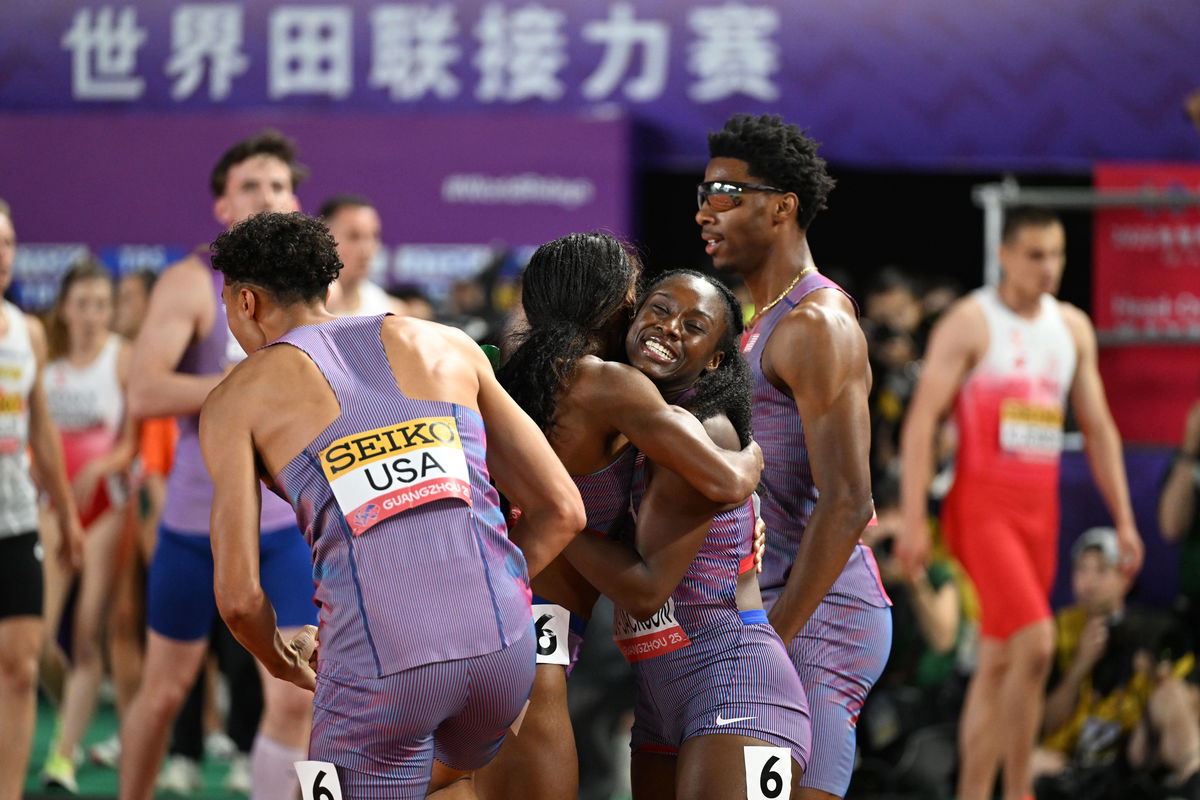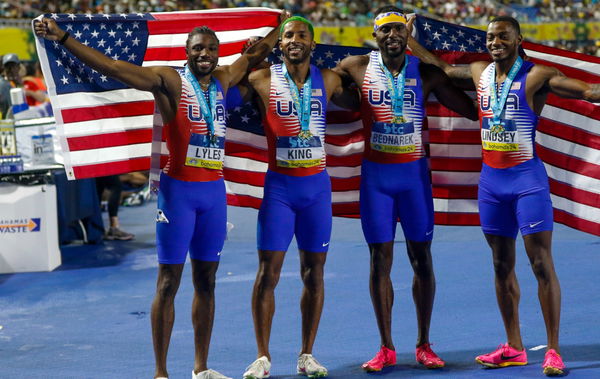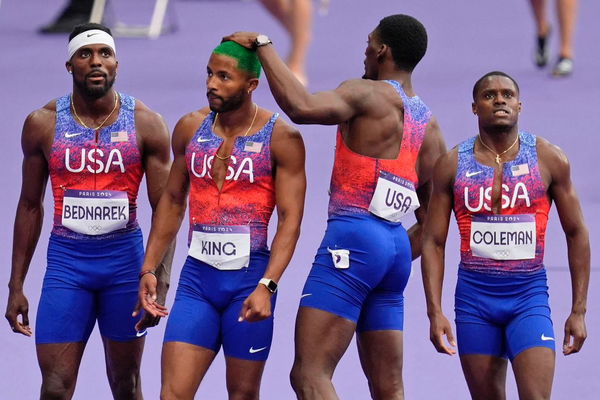
Imago
250511 — GUANGZHOU, May 11, 2025 — Team USA celebrate after winning the mixed 4x400m relay final at the World Athletics Relays Guangzhou 2025 in Guangzhou, south China s Guangdong Province, May 11, 2025. SPCHINA-GUANGZHOU-ATHLETICS-WORLD ATHLETICS RELAYS-DAY 2 CN SongxYanhua PUBLICATIONxNOTxINxCHN

Imago
250511 — GUANGZHOU, May 11, 2025 — Team USA celebrate after winning the mixed 4x400m relay final at the World Athletics Relays Guangzhou 2025 in Guangzhou, south China s Guangdong Province, May 11, 2025. SPCHINA-GUANGZHOU-ATHLETICS-WORLD ATHLETICS RELAYS-DAY 2 CN SongxYanhua PUBLICATIONxNOTxINxCHN
Three weeks ago in Guangzhou, Team USA’s men’s relay teams endured a disappointing showing. In the 4x100m relay final, the American squad—featuring Kenny Bednarek, Courtney Lindsey, Kyree King, and Brandon Hicklin—was unable to secure the gold, finishing behind a South African team led solely by Akani Simbine as its standout name. Despite Bednarek clocking the fastest splits in both the semifinal and final, the U.S. team couldn’t turn that into a winning result. Meanwhile, the men’s 4x400m relay team hit an unprecedented low, failing to even qualify for the final—a shocking outcome for the traditionally dominant squad.
Watch What’s Trending Now!
At the upcoming World Athletics Championships, Team USA’s men will be absent from the 4x400m relay event—a stark contrast to just ten months ago, when the team of Rai Benjamin, Christopher Bailey, Vernon Norwood, and Bryce Deadmon successfully defended their Olympic title, even setting a new Olympic record of 2:54.43 in the process. Since then, both the lineup and the results have taken a downturn. A similar story unfolded in the men’s 4x100m relay at the Paris Olympics. Despite a star-studded team featuring Kenny Bednarek, Christian Coleman, Kyree King and Fred Kerley, the squad was disqualified due to an illegal baton exchange. That disqualification extended Team USA’s Olympic gold medal drought in the men’s 4x100m to two decades. In light of these recurring setbacks, a pressing question has emerged: What’s the remedy for this ongoing relay crisis? A veteran coach from the Florida Gators track and field program has offered a potential solution.
In a recent episode of Ready Set Go, Coach Mike Holloway joined Justin Gatlin and Rodney Green for a discussion. When Gatlin brought up the persistent struggles of the U.S. men’s relay teams, he asked Holloway what could be done to fix the issue. Coach Holloway began by emphasizing the importance of team chemistry, pointing out that relay athletes need to build familiarity with one another. “You see that here of Tom Jones, you saw it at Texas Relays, you saw it at Florida Relays,” he explained. “They have to get familiar with each other, right?” He highlighted how the Canadian team consistently comes to the Florida Relays, runs around 38 seconds, and then shows up at the World Championships or Olympics and clocks 37-mid—largely because they can rely on the U.S. team to make mistakes. Holloway argued that if American athletes trained together more often, they’d be hard to beat. However, he also acknowledged that changes need to happen at the coaching level to truly turn things around.

Coach Mike Holloway admitted that neither he nor Dennis Mitchell may be the ideal choice to lead the U.S. relay squads. “You can’t coach a relay when that’s not your job, right?” he said. Instead, he pointed to coaches from Division II programs who have successfully worked with relays and elite sprinters. These coaches, he explained, truly grasp the athlete’s mindset and the straightforward fundamentals of relay running. “D2 has coached world-class speed. So, he understands the mindset, he understands the simplicity of the things.” And I think the biggest thing is, is again, you were very involved with good relays. It wasn’t about a rah-rah and all this stuff,” the 66-year-old said, adding that their success doesn’t come from hype or theatrics, but from a solid understanding of relay execution.
Still, Holloway stressed that results will only come through a consistent, structured approach. He suggested forming a dedicated pool of 4–5 sprinters who train together regularly, building chemistry and trust over time. To illustrate his point, he walked the hosts through a hypothetical scenario, using an imaginary situation to clearly convey how this kind of system could lead to success.
The track and field painted a vivid picture to make his point, saying, “So if I said to you today, hey man, we’re going to go, we’re going to go Coleman to Bednarek to Knight and to Lyles. The thought of that is scary, right? But it’s scarier if we don’t practice it.” He emphasized that all of these athletes are based in Florida, so there’s no reason they can’t train together more regularly.
“Why don’t you get them together on occasion and just say, ‘Hey Dennis, I’ll send Errion down there and work some sticks today, dog.’ I’m good with that. You know, they just got to be together more often.” According to Holloway, this kind of consistent collaboration is exactly how countries like Italy and Canada have managed to excel in relay events. However, not everyone thinks small adjustments will be enough. Another track and field icon has gone a step further, advocating for a complete overhaul of the current system if Team USA wants to reclaim its dominance in the relays.
The track and field legend advises bringing holistic changes to Team USA
Following yet another disastrous showing by Team USA’s men’s 4x100m relay squad at the Paris Olympics, nine-time Olympic gold medalist Carl Lewis didn’t hold back. Frustrated by the team’s continued failure, Lewis took to X with a fiery message aimed directly at USA Track and Field: “It is time to blow up the system,” he declared.

The sprinting legend slammed the organization, accusing it of prioritizing personal relationships over performance. “This continues to be completely unacceptable,” he wrote. “It is clear that EVERYONE at [USA Track and Field] is more concerned with relationships than winning,” Lewis didn’t mince words in his call for drastic change, insisting, “No athlete should step on the track and run another relay until this program is changed from top to bottom.” His passionate statement sparked intense debate, reigniting the conversation around how one of the most dominant sprinting nations continues to fall short on the global stage in one of track and field’s most prestigious events.

